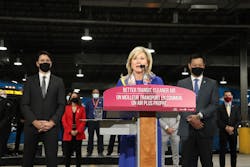Three Mississauga transit projects to see joint C$677 million investment
Mississauga, Ontario, will be able to advance a series of transit advancements with joint funding provided by the governments of Canada and Ontario, as well as local funding from the city of Mississauga. The government of Canada explains the investments will support increased capacity, quality and safety of public transit within Mississauga.
The more than C$677 million (US$531.6 million) in funding includes C$271.1 million (US$212.9 million) from the government of Canada through the Investing in Canada Infrastructure Program, more than C$225.8 million (US$177.3 million) from Ontario and more than C$180.7 million (US$141.9 million) from the city.
“Today’s investments will make Mississauga an even better place to live and work by helping Canadians get where they need to be in cleaner, faster and more affordable ways. Improving public transit across the country makes our communities healthier and fights climate change, while creating good middle-class jobs,” said Prime Minister Justin Trudeau.
The joint funding will help support C$12.5 million (US$9.81 million) in transit priority measures for express corridors. The investments will be applied toward queue jump lanes at 25 intersections on Derry, Eglington and Dixie Roads. With upgrades to existing bus corridors, the city says it will see a reduction in congestions, passenger wait times and delays and improvements in the overall experience of transit users.
Approximately C$305.7 million (US$240 million) will be applied toward the construction of a new bus rapid transit (BRT) corridor along Dundas Street. The Dundas BRT is one of six priority projects the city identified last fall to focus funding. The project plans to extend BRT along Dundas Street for 48 kilometers (29.8 miles) to create fast, frequent and reliable transit between Greater Toronto and the Hamilton Region.
The third project to benefit from the joint funding is the city’s bus replacement program, which will see C$359.7 million (US$282.4 million) invested to purchase 358 second-generation hybrid buses to replace existing vehicles in Mississauga’s MiWay fleet. The planned bus replacement includes 314 40-foot low floor transit buses and 44 60-foot low floor buses.
“This is a big day for Mississauga and I want to sincerely thank the government of Canada and the government of Ontario for investing in Mississauga, our residents and our future,” said Mississauga Mayor Bonnie Crombie. “These investments will significantly strengthen our local transit system while helping us reach our climate targets. Funding to build rapid bus transit along Dundas Street, in particular, will make it easier for residents to travel to and from Mississauga and is critical for regional economic growth and recovery. The Dundas BRT will further strengthen our east to west connections, reducing travel times and connecting people to more job opportunities and businesses to more customers.”
Geoff Wright, Commissioner, Transportation and Works for Mississauga, added, “This investment helps us encourage transit usage and provide customers with integrated and convenient transit options that meet their daily needs, advancing our Strategic Plan goal of developing a transit-oriented city.”
About the Author

Mischa Wanek-Libman
Group Editorial Director
Mischa Wanek-Libman is director of communications with Transdev North America. She has more than 20 years of experience working in the transportation industry covering construction projects, engineering challenges, transit and rail operations and best practices.
Wanek-Libman has held top editorial positions at freight rail and public transportation business-to-business publications including as editor-in-chief and editorial director of Mass Transit from 2018-2024. She has been recognized for editorial excellence through her individual work, as well as for collaborative content.
She is an active member of the American Public Transportation Association's Marketing and Communications Committee and served 14 years as a Board Observer on the National Railroad Construction and Maintenance Association (NRC) Board of Directors.
She is a graduate of Drake University in Des Moines, Iowa, where she earned a Bachelor of Arts degree in Journalism and Mass Communication.
